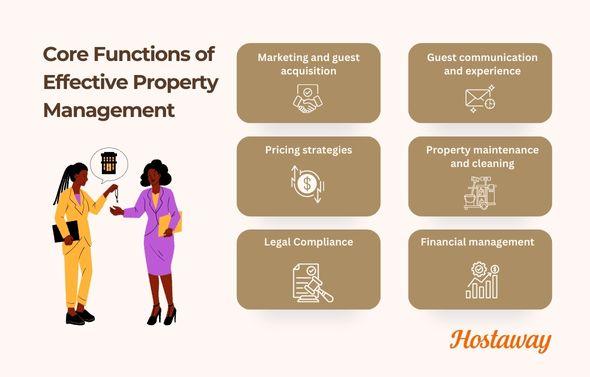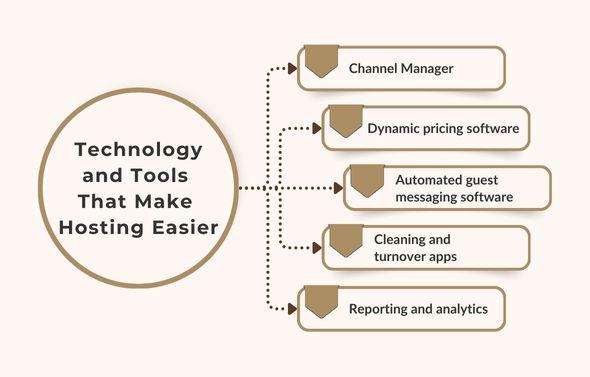Property Management 101: Understanding Key Concepts and Best Practices

Did you know the short-term rental industry is expected to reach $228 billion globally by 2030? With platforms like Airbnb, VRBO, and Booking.com growing year after year, more people are diving into vacation rentals than ever before. But here’s the catch, listing a property isn’t enough to guarantee success.
Whether it’s a beachfront condo or a cozy city loft, the difference between a fully booked calendar and an empty one often comes down to how well you manage your property. Guests today expect more than just a place to sleep, they want smooth check-ins, quick communication, and a spotless home that feels worth every dollar.
That’s where property management comes in. For property managers and short-term rental hosts, it’s the art (and science) of balancing profitability with guest satisfaction. From setting the right price to keeping up with maintenance, the way you manage your rental directly impacts both your income and your reviews.
This guide will walk you through the essentials of Property Management 101 for vacation rental hosts. Whether you manage everything yourself or work with a property management company, these strategies will help you streamline operations, impress guests, and grow your rental income with confidence.

The Role of a Vacation Rental Property Manager
Running a short-term rental is a bit like running a mini hotel, except you’re the front desk, the cleaning crew, and the marketing team all rolled into one. That’s essentially the role of a vacation rental property manager, keeping everything behind the scenes running smoothly so guests enjoy a hassle-free stay.
Here are some of the key responsibilities:
Guest communication: Answering questions quickly, sending check-in instructions and making sure guests feel supported during their stay.
Turnover management: Coordinating cleaning and restocking between stays so every guest arrives to a fresh, spotless property.
Pricing & bookings: Adjusting nightly rates based on seasonality, demand, or local events, and ensuring calendars stay accurate across all booking platforms.
Maintenance & repairs: Handling small property maintenance issues before they become major problems and arranging contractors for necessary repairs.
Compliance: Navigating local ordinances, permits and tax requirements to keep your rental legally sound.
For new hosts, self-managing often makes sense, it saves money and gives you full control. But as your bookings increase, so does the workload. That’s when many property managers begin looking for smarter ways to scale.

How Property Management Software Makes Hosting Easier
Instead of outsourcing everything to a property management company, many property managers are now turning to property management software (PMS) to lighten the load while keeping control of their rental business.
Property management software acts like a digital assistant that takes care of repetitive tasks and keeps everything organized in one place. Here’s how it can help:
Calendar syncing: Automatically updates availability across platforms like Airbnb, VRBO, and Booking.com to prevent double bookings.
Automated guest messaging: Sends instant booking confirmations, check-in instructions and reminder messages, saving you hours of back-and-forth.
Dynamic pricing integration: Connects with tools like PriceLabs or Wheelhouse to adjust rates in real time based on demand, seasonality, or local events.
Cleaning & turnover coordination: Integrates with apps like TurnoverBnB or Properly to schedule cleanings, share checklists, and track task completion.
Centralized financial tracking: Keeps your income, expenses, and fees neatly organized so you always know how your property is performing.
The result? Less time spent on manual work and more time focusing on what matters most delighting your guests and growing your income.
For property managers managing multiple properties, or even just a single busy listing, property management software can be the difference between feeling overwhelmed and running a streamlined, profitable business.

Residential vs. Commercial Property Management (A Quick Look)
When people hear “property management,” they often think of long-term residential leases or commercial buildings like office spaces and retail centers. Those areas do share some overlap with short-term rentals, but vacation rentals come with their own unique challenges and opportunities.
Residential properties (long-term rentals):
Residential property management focuses on securing reliable tenants, managing lease agreements that last months or years, tenant relations and ensuring steady monthly rent collection. The priority for property owners is stability and tenant retention.
Commercial properties (office buildings, retail, warehouses):
Commercial property management is even more complex, involving negotiations with commercial tenants, managing multiple lease agreements, and strict adherence to building codes and local laws. The focus here for property owners is often on minimizing vacancy in large, high-value spaces.
Vacation rentals (short-term rentals):
Short-term rental property management is closer to hospitality than traditional property management. Instead of monthly rent, your income depends on high occupancy rates, great guest reviews, and the ability to adjust pricing quickly. The focus is on guest experience, fast turnovers and maximizing income week by week.
This is why short-term rental property managers benefit so much from using property management software. Tools designed for vacation rentals help you handle frequent guest communication, automate dynamic pricing and keep up with maintenance of the property, all things that long-term landlords or commercial property managers rarely deal with at the same intensity.
In other words, while residential and commercial property management are about long-term stability, vacation rental management is about adaptability, speed, and hospitality.

Core Functions of Effective Property Management
Managing a vacation rental is part business, part hospitality. To keep your vacation rental property running smoothly (and your reviews glowing), you’ll need to stay on top of several key areas.
Marketing and guest acquisition
A great listing is your first impression. High-quality photos, compelling descriptions and strong reviews help you stand out on platforms like Airbnb and VRBO. Beyond that, marketing means optimizing your presence across multiple booking channels, running promotions during off-season dips, and keeping your calendars perfectly in sync.
Many property managers use a channel manager to handle this. With Hostaway, you can connect your listings to dozens of booking platforms and manage them from one dashboard, no more juggling logins or risking double bookings.
Pricing strategies
Unlike long-term rentals, vacation rentals thrive on flexible pricing. Rates should reflect demand, seasonality, and local events. Setting the right nightly rate often means the difference between an empty calendar and a fully booked one.
Hostaway's dynamic pricing tool automatically adjusts your rates using real-time market data. It helps you capture higher nightly prices when demand is strong while staying competitive during slower periods.
Guest communication and experience
Guest communication is the heartbeat of short-term rental management. Prompt responses, clear check-in instructions, and friendly reminders create the kind of experience that earns five-star reviews.
Instead of juggling messages across multiple platforms, Hostaway centralizes guest communication and even lets you set up automated yet personalized messages. That way, guests get the information they need quickly, and you save hours of manual texting and emailing.
Property maintenance and cleaning
A spotless property isn’t just nice to have, it’s essential. Regular inspections, quick fixes and professional cleanings between stays ensure guests always arrive to a comfortable, well-kept space.
With Hostaway’s integrations, you can connect directly to cleaning apps like Turno or Properly. These tools assign tasks, share checklists with cleaners, and update you when turnovers are complete, so nothing slips through the cracks.
Legal compliance for short-term rentals
Every city has its own rules around short-term rentals. Permits, taxes, occupancy limits and noise restrictions can vary widely. Staying compliant is critical to avoiding fines and keeping your business sustainable.
Hostaway helps by keeping property details, booking data, and financial records in one place, so it’s easier to stay organized and prepared if regulations shift in your market.
Financial management
Behind every successful vacation rental is solid financial management. Tracking income, expenses, cleaning costs, and platform fees helps you understand true profitability.
Hostaway’s reporting dashboards make this simple. You can view performance across all channels, spot trends in your income and keep clear records for tax season all without endless spreadsheets.
From marketing to maintenance, running a vacation rental involves a lot of moving parts. The good news? With best practices and the right tools in place, you can save time, reduce stress, and deliver the kind of guest experience that keeps your calendar full.

Choosing Between a Property Management Company and Property Management Software
As your rental business grows, you’ll eventually face a big decision: Do I outsource everything to a property management company, or invest in property management software to handle operations myself?
Both options can work, but the right choice depends on how hands-on you want to be, how much you’re willing to spend, and how much control you want over guest experience.
Here’s a side-by-side comparison:
Aspect | Property management company | Property management software (PMS) |
Control | Most decisions are handled by the company. You may have limited input. | You stay in control of pricing, guest communication and strategy. |
Cost | Typically 15–30% of rental income in fees. | Flat monthly subscription often much cheaper long-term. |
Scalability | Easy to scale, but at a high cost as you add more properties. | Scales affordably manage multiple properties from one dashboard. |
Guest communication | Handled by the company, but messaging may feel less personal. | Automated yet customizable messages keep the personal host touch. |
Pricing strategy | Managed by the company. You may not see how rates are set. | Dynamic pricing tools (like Hostaway’s) adjust rates in real time. |
Maintenance & cleaning | Scheduled by the company, often with preferred contractors. | You choose your team, with tools like TurnoverBnB integrated for easy scheduling. |
Financial transparency | Reports are provided but may lack detail. | Real-time dashboards give full visibility into income, expenses, and performance. |
Best for | Owners who want to be completely hands-off. | Hosts who want automation without giving up control or paying hefty fees. |
For many vacation rental property managers, the sweet spot is software. It gives you the freedom to stay in charge of your rental ,choosing your cleaners, setting your pricing, and customizing guest communication, while automating the time-consuming tasks that can overwhelm even experienced hosts.
By using a PMS like Hostaway, you don’t have to hand over 30% of your income to a third-party manager. Instead, you get the same professional-level efficiency while keeping your profits, your brand, and your guest experience in your own hands.

Technology and Tools That Make Hosting Easier
One of the biggest advantages property managers have today is access to powerful tools that were once only available to large hotels. The right technology doesn’t just save time, it makes your vacation rental more professional, consistent, and scalable.
Here are some of the most useful tools for vacation rental managers:
Channel managers: Keep your listings synced across Airbnb, VRBO, Booking.com, and more. This prevents double bookings and saves you from manually updating multiple calendars. (Hostaway includes a built-in channel manager so everything runs from one dashboard.)
Dynamic pricing software: Automatically adjusts your nightly rates based on demand, seasonality, and local events. Hostaway offers its own pricing tool, plus integrations with providers like PriceLabs and Wheelhouse, giving you full flexibility.
Automated guest messaging: No more typing the same check-in instructions or thank-you notes over and over. Automation tools let you schedule personalized messages that go out at the right time, ensuring guests feel cared for without extra effort.
Cleaning and turnover apps: Tools like TurnoverBnB or Properly help you assign cleaning tasks, share checklists, and confirm when turnovers are complete. With Hostaway’s integrations, these updates flow directly into your PMS.
Reporting and analytics: Good decisions require good data. A PMS like Hostaway centralizes your rental income, expenses, and occupancy rates into clear dashboards so you always know how your proeprty is performing.
Together, these tools create a streamlined system where nothing slips through the cracks. And when they’re connected through a property management software like Hostaway, you don’t have to juggle separate apps, the PMS becomes your all-in-one control center for marketing, operations, and guest experience.

Common Challenges for Short-Term Rental Hosts
Even the most experienced hosts run into bumps along the way. Short-term rentals move fast, and it’s easy to feel stretched thin when problems pile up. Here are some of the most common challenges and how to tackle them:
Challenge | Solution |
Last-minute cancellations | Use dynamic pricing tools to automatically lower rates and attract last-minute bookings to fill gaps. |
Maintenance issues between guests | Schedule regular inspections and use a PMS to track necessary repairs so properties stay guest-ready. |
Keeping up with guest messages | Automate guest messaging for confirmations, check-in details, and reminders. Step in personally only when needed. |
Juggling multiple listings | Centralize calendars, cleaning schedules, and pricing with an all-in-one PMS like Hostaway. |
Navigating regulations | Keep permits, taxes, and booking data organized in your PMS to stay compliant with local ordinances. |
Challenges are part of the business, but they don’t have to slow you down. By combining proactive planning with the right tools, you can turn these common pain points into manageable tasks and keep your rental business running smoothly no matter what comes your way.

Hosting Made Simple
Running a vacation rental can feel overwhelming at times, but it doesn’t have to be. With the right mix of strategy, tools, and hospitality, managing your property becomes less about putting out fires and more about building a business you’re proud of.
Whether you’re just starting out with one listing or scaling to multiple properties, success comes from consistency and adaptability. When you simplify operations and stay guest-focused, five-star reviews, repeat bookings, and steady rental income naturally follow.
So here’s the takeaway: you don’t need to do everything yourself, you just need the right system behind you. And once you have that in place, hosting stops being stressful and starts being sustainable.
Frequently Asked Questions
1. What’s the difference between vacation rental software and Airbnb’s built-in host tools?
Airbnb and VRBO do provide basic tools for messaging, calendars, and pricing—but only within their own platforms. Property management software goes much further by syncing across multiple booking sites, automating communication, integrating with cleaning tools, and centralizing financial reporting. It’s designed for hosts who want to scale and stay organized beyond a single platform.
2. How do I know if I’m ready for property management software?
A good rule of thumb is: if you find yourself spending more than a few hours a week on guest messaging, calendar updates, or cleaning coordination, it’s time to consider software. Hosts with multiple properties or those struggling with double bookings, missed messages, or inconsistent pricing will especially benefit from a PMS.
3. Will using property management software affect my guest’s experience?
Yes—positively! Guests often won’t even realize you’re using software, but they’ll notice the benefits: faster replies, smoother check-ins, cleaner properties, and clearer communication. Automated systems actually give you more time to add personal touches, rather than less.
4. How does property management software help with taxes?
A PMS keeps all your booking and expense data in one place, which makes tax season much easier. Instead of piecing together numbers from Airbnb, VRBO, Booking.com, and your receipts, you’ll have centralized reports to give your accountant—or use yourself if you file independently.
5. What happens if local short-term rental regulations change?
Property management software can’t prevent regulation changes, but it can make it easier to adapt. With all your data organized, you’ll have quick access to occupancy records, booking history, and tax documentation—often the exact information regulators ask for.
6. How much should I expect to pay for property management software?
Pricing varies depending on the provider, but most PMS platforms charge either a flat monthly subscription or a small percentage of bookings. Compared to a property management company (which usually charges 15–30% of rental income), software is generally far more cost-effective.
Ready to find out how Hostaway can transform your business?
